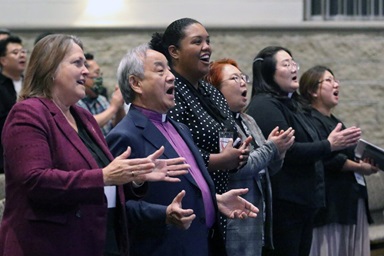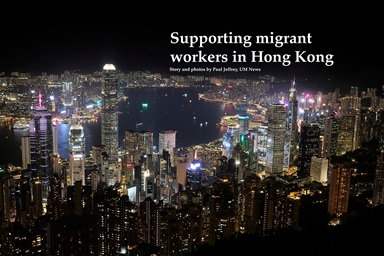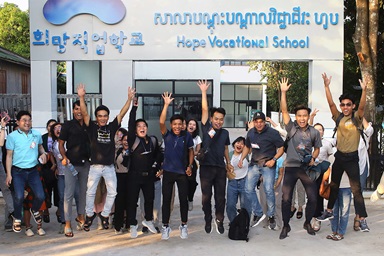The Rev. Ronnie P. Inis was in his car when he felt the blast of a bomb that shook Davao City.
“I just arrived from my long drive, when I was about to get out from my car,” he said. “I heard the explosion, and my car was shaken.”
Inis is the administrative pastor of Cathedral United Methodist Church, which is in the area where the Sept. 2 bombing occurred. Inis had parked his car about 300 meters away from the blast.
The government is blaming the Abu Sayyaf, a militant group with links to the Islamic State, for the night bombing. The attack, which occurred in a busy market area, killed at least 14 people and injured more than 60.
On Sept. 6, the National Council of Churches in the Philippines strongly denounced the “senseless and inhumane bombing” as an attack that is “an affront to the Creator and Author of Life.”
The statement also called on President Duterte to make public the scope and parameters of his declaration placing the country under a state of lawlessness because of the bombing.
The statement said the council understands the need for the declaration but the public needs to understand the nature and specifics of the declaration to remove fears and doubts that this will eventually lead to martial law.
“We call on our churches, partner organizations and networks to lift the families of the fatalities in our collective thoughts and fervent prayers at this most difficult and trying times of their lives,” said the statement signed by Justice Raoul V. Victorino, council chair, and the Rev. Rex RB. Reyes Jr., general secretary.
Working with police
Inis said he has been in touch with Erlan Guevarra, the barangay (district or neighborhood) captain who is also a United Methodist, to identify ways the church can help victims.
Inis said he and Guevarra are in the process of getting the data from the police. The police are searching for victims’ families as well as families who depend on the night marketing for a living.
“It is definite that there are no casualties from our church,” Inis said. “We would like to help the families of the victims and help as well the people here in our barangay who are the vendors of that night market. They are the ones greatly affected.”
President Rodrigo Duterte, who is from Davao City, declared a state of lawlessness, and all night clubs and other establishments in the city were instructed to close.
Bishop Ciriaco Q. Francisco, who leads the Davao Episcopal Area, said he and his wife had dinner the night before in the area where the explosion occurred. He described it as a street market where “plenty of people” gather at night.
"We are safe by God's grace,” the bishop said.
Earlier in the day, he had participated in an inter-religious forum hosted by the Al Qalam Institute for Islamic and Dialogoue in Southeast Asia at Ateneo De Davao University, “but after the activity, we went back to Kidapawan City,” he said in a note to United Methodist News Service. “The bombing was around 200 meters away from the gate of university.”
The bishop expressed gratitude for those who had sent messages of support for the Davao City area.
The Rev. Israel Painit, superintendent of the Southeast District and chair of the Philippines Board of Church and Society, cited two possible causes for the bombing. It could have been intended as “a slap on President Duterte's non-compromising stance” on fighting drug trafficking, or it could be “a terrorism-related incident purposely to let the world know that the (Abu Sayyaf) group is not intimidated by the president's effort to crush the terrorist group,” he said.
Standing in solidary
Retired Bishop Leo A. Soriano, who also lives in Davao City, said, “The location of the incident is just at the next corner from our church. At this time we are grieved that this happened. Prayers, of course is what we can do right now, and ask the people to remain calm. My reflection on this is that there are those who want to discredit/sabotage the efforts of the president for a better Philippines.”
Thomas Kemper, chief executive of the United Methodist Board of Global Ministries, expressed support for the people of the Philippines in a report on the board’s website.
“We are in solidarity with the people of the Philippines in this time of grief and uncertainty, and especially with the United Methodist community, which is deeply invested in peace efforts in Davao City area,” said Kemper, who was attending the World Methodist Conference in Houston.
The board reported that it has more than a dozen missionaries in the Philippines, including a young adult missionary in Davao City who was away at the time of the blast. There are more than 216,000 United Methodists in the Philippines.
Mangiduyos is a United Methodist News Service correspondent based in the Philippines.
Like what you're reading? Support the ministry of UM News! Your support ensures the latest denominational news, dynamic stories and informative articles will continue to connect our global community. Make a tax-deductible donation at ResourceUMC.org/GiveUMCom.



